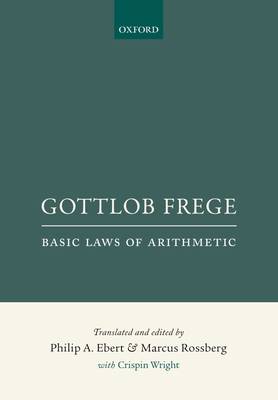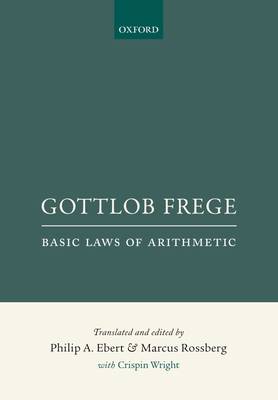
- Retrait gratuit dans votre magasin Club
- 7.000.000 titres dans notre catalogue
- Payer en toute sécurité
- Toujours un magasin près de chez vous
- Retrait gratuit dans votre magasin Club
- 7.000.000 titres dans notre catalogue
- Payer en toute sécurité
- Toujours un magasin près de chez vous
Basic Laws of Arithmetic, Volumes I & II
Derived Using Concept-Script
Livre broché | Anglais
68,95 €
+ 137 points
Description
The German philosopher and mathematician Gottlob Frege (1848-1925) was the father of analytic philosophy and to all intents and purposes the inventor of modern logic. Basic Laws of Arithmetic, originally published in German in two volumes (1893, 1903), is Frege's magnum opus. It was to be the pinnacle of Frege's life's work. It represents the final stage of his logicist project -- the idea that arithmetic and analysis are reducible to logic -- and contains his mature philosophy of mathematics and logic. The aim of Basic Laws of Arithmetic is to demonstrate the logical nature of mathematical theorems by providing gapless proofs in Frege's formal system using only basic laws of logic, logical inference, and explicit definitions. The work contains a philosophical foreword, an introduction to Frege's logic, a derivation of arithmetic from this logic, a critique of contemporary approaches to the real numbers, and the beginnings of a logicist treatment of real analysis. As is
well-known, a letter received from Bertrand Russell shortly before the publication of the second volume made Frege realise that his basic law V, governing the identity of value-ranges, leads into inconsistency. Frege discusses a revision to basic law V written in response to Russell's letter in an afterword to volume II. The continuing importance of Basic Laws of Arithmetic lies not only in its bearing on issues in the foundations of mathematics and logic but in its model of philosophical inquiry. Frege's ability to locate the essential questions, his integration of logical and philosophical analysis, and his rigorous approach to criticism and argument in general are vividly in evidence in this, his most ambitious work. Philip Ebert and Marcus Rossberg present the first full English translation of both volumes of Frege's major work preserving the original formalism and pagination. The edition contains a foreword by Crispin Wright and an extensive appendix providing an introduction to Frege's formal system by Roy T. Cook.
well-known, a letter received from Bertrand Russell shortly before the publication of the second volume made Frege realise that his basic law V, governing the identity of value-ranges, leads into inconsistency. Frege discusses a revision to basic law V written in response to Russell's letter in an afterword to volume II. The continuing importance of Basic Laws of Arithmetic lies not only in its bearing on issues in the foundations of mathematics and logic but in its model of philosophical inquiry. Frege's ability to locate the essential questions, his integration of logical and philosophical analysis, and his rigorous approach to criticism and argument in general are vividly in evidence in this, his most ambitious work. Philip Ebert and Marcus Rossberg present the first full English translation of both volumes of Frege's major work preserving the original formalism and pagination. The edition contains a foreword by Crispin Wright and an extensive appendix providing an introduction to Frege's formal system by Roy T. Cook.
Spécifications
Parties prenantes
- Editeur:
Contenu
- Nombre de pages :
- 680
- Langue:
- Anglais
Caractéristiques
- EAN:
- 9780198777304
- Date de parution :
- 18-10-16
- Format:
- Livre broché
- Format numérique:
- Trade paperback (VS)
- Dimensions :
- 244 mm x 170 mm
- Poids :
- 1156 g






